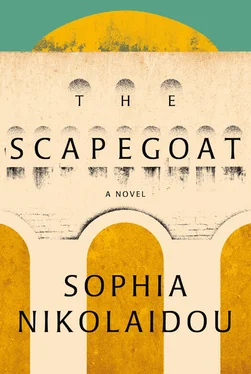I didn’t reply. He took a sip of his drink and turned on the TV. If there’s one thing I respect about him, it’s that he knows when to keep quiet.
THROUGH OTHER EYES
The faculty meeting was scheduled for six p.m. The teachers were sitting in groups, some chatting or whispering in one another’s ears, others ostentatiously bored. The principal was still in his office, rustling papers, looking over his agenda. The vice principal — a little meatball of a woman with spindly legs and a girlish ponytail, who sang songs from the resistance when she was in a good mood and always had a smile for everyone, as one of her tricks for getting things done — was already in her seat. She looked out at the warring factions before her: the dad types; the union organizers; the loners who kept their heads down and avoided taking sides; the silent, patient types; the ones who were critical of everyone but themselves; the pissed-off-for-no-reason; the arrogant and annoyingly talkative; the neutrality seekers; the politically engaged. It was each man for himself or everyone thick as thieves, depending on who had what to gain.
In the far left corner of the room, with the back of his chair tilted against the wall, sat Soukiouroglou. He had a book in his lap, a prop to occupy his eyes and hands. He held it open and turned a page every so often, though it was anyone’s guess whether he was actually reading.
— Contrary to our usual practice, the principal announced on entering the room, the student council representatives will be present at this meeting.
The students filed in, the middle schoolers unsure of themselves, waiting for the older kids to take their seats first. Chairs had been set up for them in the center of the circle, exposed to view on all sides— a spot chosen on purpose by the administration , some would later suggest. The middle school student council president wiped his sweaty palms on his pants. The high school representatives, on the other hand, sat there with a combative air and notebooks at the ready. The girls crossed their legs almost brazenly. Some of the veteran teachers in the room took offense at that stance, though none of them said anything. Their disapproving looks were enough.
The next day some of the teachers defended them— they’re just kids, they haven’t learned how to sit properly, where to put their legs —but most of them knew that body language speaks volumes, reveals all kinds of secret thoughts. Like when Minas Georgiou, who was nearly two meters tall, stretched his gangly legs in their clunky combat boots straight out under the seat in front of him, bottoms up, as if he were mocking them with the red smiley faces painted on the rubber soles. Some were startled, others just figured it was yet another instance of ridiculous teenage fashion, one of those fads that last half a season, tops. Minas watched the meeting unfold with that passive smile kids wear when they want grown-ups to just get off their backs.
The principal scanned the agenda. Rising to his feet, proud of his democratic impulses, which some dissenters called a shocking lack of responsibility, he opened the floor to the students first.
— I’d like to share with you the statement prepared by our fifteen-member council, began Evelina, the high school student council president. We’d like your permission to organize a one-day event at our school concerning the global financial crisis.…
Before she’d even finished her sentence, a current of whispers had spread over the teachers’ part of the room. A few snickered loudly.
— They should forget this nonsense and start studying, exam time is right around the corner, one teacher hissed to his neighbor.
But some teachers supported the idea, and a few were giving the kids encouraging looks; it was obvious that one or two had offered pointers ahead of time. Among them was the skin-and-bones physics teacher, whom her colleagues called a freak behind her back, because of her messy hair and cherry-red combat boots. She was always getting the kids worked up over something. Once last year she even took them to a protest when they were supposed to be in class. Plenty of teachers in the room were already annoyed at how this group of snot-nosed brats had come that evening to express their political will.
The students stammered that a one-day event with presentations by economists, lawyers, and sociologists would have educational value.
— Sir, we’re the ones who are going to bear the brunt of the crisis, one of the middle schoolers pleaded to the principal.
— I think we’ve spent enough time on this issue, the chemistry teacher broke in. He had a private lesson scheduled for eight that evening and was in a hurry to get going.
— Perhaps you’d like to propose some names of possible speakers, one teacher said, the irony thick in her voice.
The students looked at her, speechless.
— What did you think, that events just plan themselves? she exclaimed, pleased with herself.
Most of them agreed that the kids were looking for excuses to miss class.
The teachers knew that the students had been negotiating in the principal’s office over the past few days. The students promised not to allow a sit-in. They’d learned a thing or two since last year’s occupation, when kids who didn’t go to their school had come and gone freely, and computers stolen from the computer lab ended up being sold out in the open on pedestrian streets in the city center. The punks would lay them out on torn cardboard boxes and sell them at cut prices, or break them down for parts: a motherboard on Melenikou Street, a brand-new keyboard on Athonos Square. Three months after the sit-in they were still having computer science class on the blackboard. If one kid’s father, a high-level banker, hadn’t donated old desktops from one of his branches, they would still be taking notes about websites with paper and pencil.
— All the other schools are having sit-ins, Evelina had told the principal in her usual blasé tone a few days prior to the faculty meeting. They’re all making fun of us, she said.
— Calling you wusses, huh? the principal asked, trying to show off his knowledge of student slang.
— Something like that, Evelina muttered. How could she possibly repeat the long list of obscenities that students from nearby schools were showering on them? New compound words, neologisms, unspeakably imaginative inventions accompanied by gestures, bumping and grinding, moaning and the sounds of sudden ejaculation. The principal was totally out of touch if he thought wuss was the worst the inner-city crowd could think up.
— At any rate, Evelina said, we thought we could organize a one-day event.
— Or maybe two days, said Minas, who was also there, shoving her in the ribs.
— Or two days, Evelina said, without much enthusiasm.
— That way, we’ll miss two days of classes, but with your permission, Minas added with utter sincerity, having decided to show his cards in hopes of getting this tedious conversation over with as soon as possible. The students will be happy to have achieved their main goal, the parents will be happy because a two-day event about the crisis sounds more educational than a sit-in. And we’ll all be glad the school won’t suffer any damage, he said, wrapping up his speech in complete satisfaction with how it had gone.
What Minas didn’t realize (perhaps because he was a boy at the height of a raging adolescence), though Evelina did (perhaps because she was a girl with experience as the class attendance-taker), was that complete sincerity isn’t always a rhetorical advantage, but on the contrary can be a political disadvantage — political in the wider sense of the word, Evelina would hasten to clarify. And while Evelina, as student council president, had been certain the principal’s assent would be enough, they were now told they’d need to present their proposal before the entire faculty and put it to a vote.
Читать дальше












